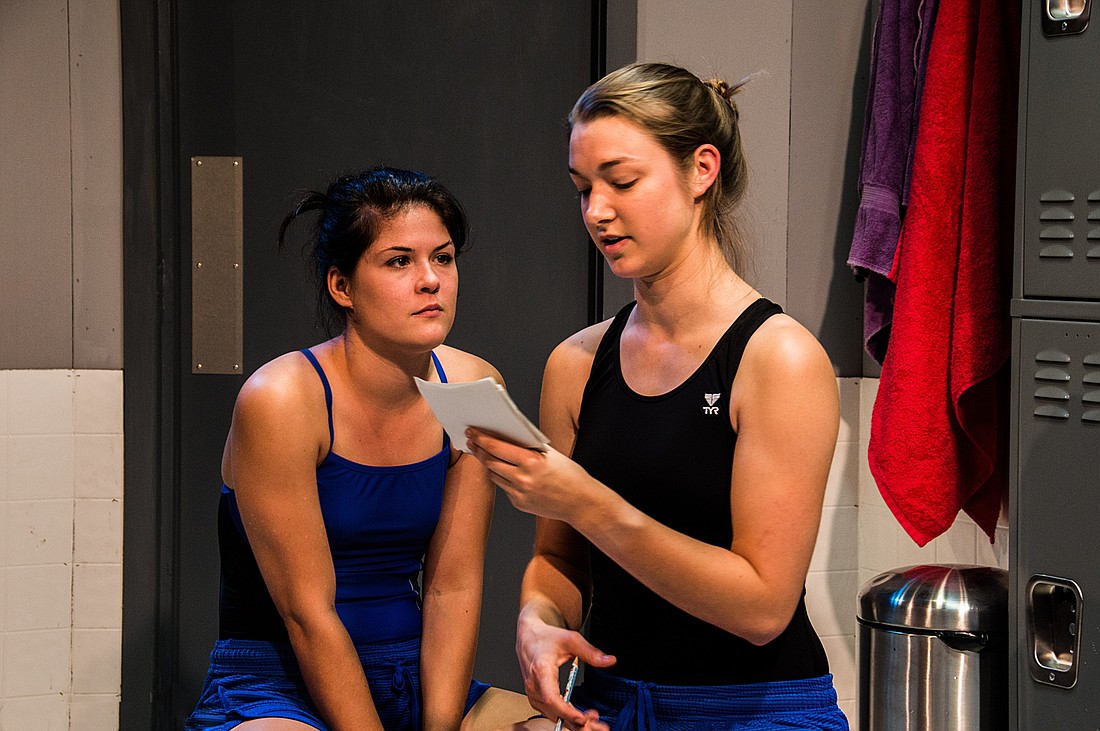- February 17, 2025
-
-
Loading

Ruby Rae Spiegel’s “Dry Land” is not for the faint of heart or weak of stomach. The Urbanite’s latest production hits you like a gut punch. And that’s exactly how it opens …
Two girls from the swim team face each other in a high school girls’ locker room. One asks the other to, “Punch me again.” She does. Again and again.
Amy (Ellie McCaw) is the human punching bag; her friend Ester (Jordan Boyer) does the pummeling. This isn’t masochism or abdominal muscle training. While the play doesn’t immediately spell out the stakes, you quickly figure it out. Amy is pregnant and doesn’t want to be. She lives in Florida, a parental notification state, so she’s trying for a DIY abortion to keep mom out of the loop.
Websites offer free advice. Options include drinking detergent and throwing yourself downstairs.
“Dry Land” puts abortion on the table, without any pro-choice or pro-life flag waving. It’s a fact of adolescent life, and only one of many horror shows. Spiegel also shows hints of eating disorders, self-loathing and casual bullying—all part of the Spanish Inquisition of the high school status system.
The playwright shows you plenty—and gives equal weight to the unseen. Except for a janitor who cleans up the bloody mess at the end, the adults are as invisible as Charlie Brown’s parents. Aside from one brief scene in an FSU dormitory, all the action unfolds in that locker room. Just outside the door, high school’s high-pressure hierarchy is only implied. It’s an oppressive system where your future success is all that matters and one screw-up equals a life of failure. The relentlessly competitive swim team is just one part of it.
Summer Dawn Wallace directs with low-key realism and avoids the third rail of emotional manipulation. The play makes you care; the director never asks you to care. The starkly realistic locker room set is the brainchild of Richard Cannon. It adds up to a matter-of-fact approach—which is exactly right for the material. High school is hell, as Josh Whedon pointed out. Accepting that horror as a fact of life only adds to the horror.
To be clear, it’s not all bad. Spiegel’s weaves witty dialog and moments of compassion through the fear and loathing. Friends betray each other; friends also come through. The play tickles your funny bone and warms your heart. When it isn’t punching you in the stomach.
Amy and Ester’s on-and-off-again friendship is the focus. Kudos to McCaw and Boyer for bringing their characters to vivid life. Josh James and Olivia Siegel are also great in their brief scenes. Richard LeVene’s janitor has no lines. He still gives you a sense that nothing surprises him anymore. He’s seen this kind of thing before.
What the audience sees isn’t a heavy-handed, one-issue play, but a multilayered slice of life in a subculture many would like to forget. High school is more limbo than life. The dry land of “the real world” begins after graduation. Until then, students are at sea and mostly on their own.
Ultimately, Amy obtains and takes the “morning after” abortion pill—and many mornings have obviously passed. She loses the fetus in a long, bloody, brutal scene. (You have been warned.) Why would she do that?
The playwright shows you why.
Amy is under pressure. Her future’s at stake—and it’s all that matters.
Spiegel brings you into Amy’s world with deft scene construction and a keen ear. She conceals her expositional artistry in seemingly random girl talk. Her dialog rings true; her depiction of casual adolescent cruelty hits home. Stephen King comes to mind. King was 26 years old when he wrote “Carrie.” The playwright was 21 years old when she wrote this.
I’m curious to see what she writes in the future.